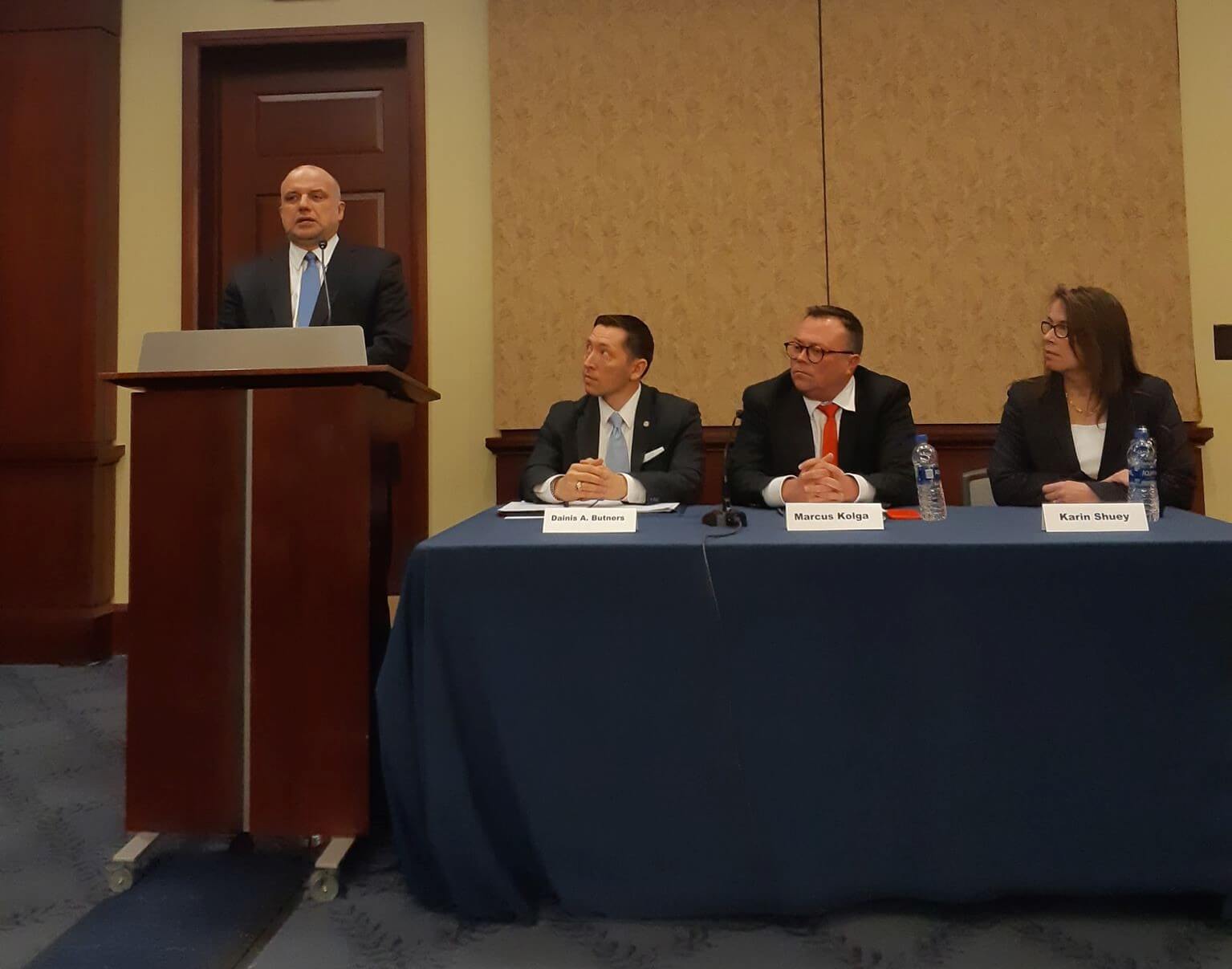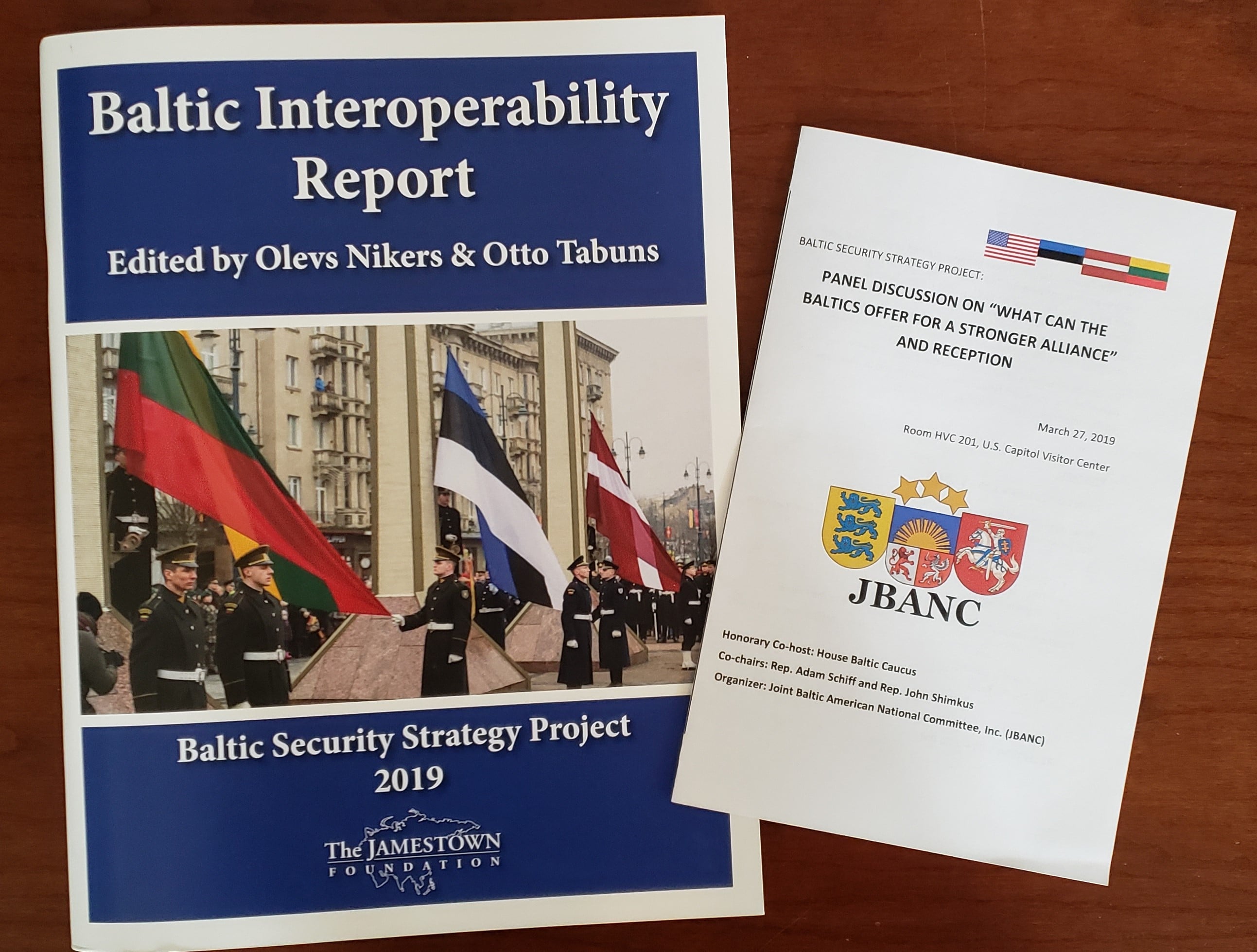
From left: Minister Jüri Luik and panel members Dainis Butners, Marcus Kolga and Karin Shuey.
The Baltic Security Strategy Project (BSSP) recently released two reports on security topics in the Baltic region. The project consists of a team of experts from Estonia, Latvia and Lithuania, led by Latvians Olevs Nikers and Otto Tabuns, and is supported by the Baltic American Freedom Foundation (BAFF), The Jamestown Foundation, and the Latvian Political Science Foundation. The primary Estonian contributor to the team’s research is Anne-Ly Reimaa, Head of International Relations on Integration Issues in the Estonian Ministry of Culture’s Cultural Diversity Department.
The reports were introduced at an event on Capitol Hill on March 27th organized jointly by the Joint Baltic American National Committee (JBANC) and the House Baltic Caucus (HBC). The event was attended by an audience of approximately 50 Congressional staffers, embassy personnel, academics, and others interested in the Baltic region. HBC co-chair Representative Adam Schiff (D-CA) and Estonian Defense Minister Jüri Luik made remarks praising the project and the Baltic nations’ contributions to NATO.
There were also two panel discussions. The first consisted of an overview by Mr. Nikers and Mr. Tabuns of the Baltic Security Strategy Report: What the Baltics Can Offer for a Stronger Alliance, which takes a strategic look at Baltic security cooperation and addresses defense and deterrence, societal security and resilience, economic security, and cyber security in the region. A closer look at the financial aspects of security was offered by Mr. Roger Robinson, formerly Vice President in the International Department of Chase Manhattan Bank and Senior Director of International Economic Affairs at the National Security Council. This panel was moderated by JBANC’s Karl Altau and highlighted air defense, maritime capabilities, and permissive banking regulations as areas in particular need of reinforcement.
The second panel, moderated by EANC Washington, DC Director Karin Shuey, offered perspectives from two members of the Baltic diaspora. Dainis Butners, a U.S. Army veteran of Latvian descent and recent graduate of Georgetown University’s Walsh School of Foreign Service, shared his key takeaways and recommendations from the Baltic Security Strategy Report based on his experience working with the Baltic defense forces while deployed with NATO in Afghanistan. Estonian Canadian media expert Marcus Kolga delved into the very serious problem of disinformation as a threat to security in the Baltic region, throughout Europe, and in North America.
The second publication, Baltic Interoperability Report, focuses on several aspects of Baltic defense collaboration. While Estonia, Latvia, and Lithuania have successfully integrated into NATO, regional cooperation among them has room for improvement. The report reviews the history of Baltic interoperability issues from 1918 to 1940, then addresses challenges that remain in developing common approaches to ground and hybrid warfare, air defense, and cyber defense.

Minister Luik concluded the program by reminding the audience that, “We can’t influence what happens in Russia. What we can do is to be ready ourselves, to be prepared, to be united, and then the threat level goes down.” He reinforced the message that continuous U.S. presence and support in the region is critical to maintaining a credible deterrent against aggression from Russia. Finally, he highlighted that every dollar the U.S. has provided to the Baltic nations has been matched with those governments’ own investments in developing their defense forces in a deliberate and coordinated way.
Both reports will be available on the Jamestown Foundation’s website. EANC will share those links at its website, www.estosite.org and on its Facebook page, once they’re available.
All photos are by EANC and JBANC.
Karin Shuey
Washington, DC Director
Estonian American National Council
www.estosite.org










